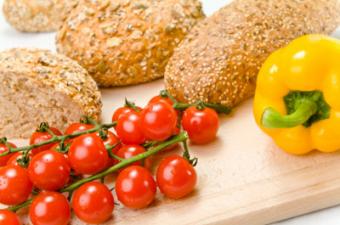
People with hypoglycemia have problems regulating their blood sugar levels, and most are advised to adopt a specific hypoglycemia diet to help minimize blood sugar swings. Some elements of the diet are common for all hypoglycemia sufferers, but there's also a certain degree of tailoring to fit individual situations required for optimal results. Your doctor can help with the fine-tuning, but here's a rundown of the basics.
Cause of Hypoglycemia
The cause of hypoglycemia can vary quite a bit, ranging from simply not eating or eating the wrong foods to taking certain medications and diabetes. Whatever the cause, the goal is to keep blood sugar levels as even as possible throughout the day. In many cases, this can be achieved by following a specific diet.
What to Eat or Drink
Some foods are better than others for preventing hypoglycemia. Many foods that help maintain optimum blood sugar levels are complex carbohydrates that are low on the glycemic index, a scale based on how fast blood sugar levels rise after consuming a food or beverage. Foods that are high on the glycemic index tend to cause rapid blood sugar spikes and plunges.
Hypoglycemia Friendly Foods and Drinks
- Lean meat, poultry or fish
- Whole grains, which includes oats, barley, quinoa, buckwheat, brown rice and wheat
- Low-fat dairy products such as yogurt, milk and cheese
- Oats (avoid pre-sweetened oatmeal)
- Eggs
- Legumes
- Nuts (avoid honey roasted, chocolate covered or sugar coated varieties)
- Seeds
- Soluble fiber fruits including apples, bananas, oranges, peaches, grapes, prunes, pears, berries, avocados and plums
- Soluble fiber vegetables including potatoes, sweet potatoes, beets, onions, carrots, peas, mushrooms, cucumbers and broccoli
- Water
- Herbal teas
- Decaffeinated tea or coffee
Foods and Drinks to Avoid
- Processed white bread, pasta or rice
- Most commercially processed baked goods
- Frosted cakes, pies or cookies
- Condiments with added sugar or high fructose corn syrup such as ketchup, barbecue sauce and jelly
- Pre-sweetened cereals
- Whole fat dairy products
- Canned fruit in syrup
- Candied fruits
- Candy
- Ice cream
- Soda
- Alcohol
- Caffeine
Hypoglycemic Food Combinations
One way to help prevent reactive hypoglycemia is to combine certain foods. Dr. Thalia Farshchian suggests that by combining foods which contain carbohydrates or sugar with a healthy fat or protein, you can slow down digestion and avoid blood sugar spikes.
The WebMD suggests combining the following snack ideas for maintaining optimal blood sugar levels:
- Hummus and vegetables
- Fruit and yogurt
- Tuna and whole grain crackers
- Apples and nut butter
Eat Small Meals and Snacks Frequently
People who have reactive hypoglycemia need to keep their blood sugar levels stable throughout the day. To do this, many health professionals recommend eating regular small meals and snacks to keep blood glucose levels from going too low, according to the National Institute of Diabetes and Digestive and Kidney Diseases. But it's not only important how often you eat, but what you eat. Eating a sugar laden candy bar every few hours will have a completely different -- and negative -- reaction on insulin levels than if you eat one of the meals suggested above.
It can be confusing to figure out which foods are best to eat for hypoglycemia. Thankfully, many great cookbooks are available to help you. Here are a couple to consider:
- The Sugar Solution Cookbook: Written by the editor of Prevention magazine, this cookbook features 200 recipes to help balance blood sugar levels. It also offers tips on how to substitute good fats and carbs in recipes. The book is available as a Kindle download for $9.99 or hardcover print for $19.80 plus shipping.
- 500 Low Glycemic Index Recipes: This cookbook offers a huge selection of recipes that use foods low on the glycemic scale. The Kindle version of the book costs $9.99 and the paperback version is $15.26 plus shipping.
The Carbohydrate Connection
While carbohydrates play an important role in any diet, meals high in simple carbohydrates may trigger hypoglycemia symptoms, according to Jackson Siegelbaum Gastroenterology. This is because simple carbohydrates digest quickly and enter the bloodstream as glucose (sugar) faster than complex carbohydrates. This results in a fast rise in blood sugar followed by a quick drop which can lead to hypoglycemia symptoms.
If you have hypoglycemia, you'll want to avoid foods high in simple carbohydrates and opt for complex carbohydrates instead. Because complex carbohydrates are released into the bloodstream as sugar more gradually, they help keep blood sugar levels stable.
The exception is, according to the Mayo Clinic, if you are having an acute hypoglycemia episode. In that case, you'll want to eat or drink a simple carbohydrate such as candy or sweetened fruit juice that will raise your blood sugar levels quickly.
Tips for Success
The Hypoglycemia Support Foundation (HSF) offers the following suggestions for implementing a successful hypoglycemia diet:
- Keep a food journal to help you identify foods that cause symptoms.
- Limit your fruit consumption, including dried fruit and fruit juice.
- Eat breakfast every day.
- Keep a supply of appropriate snacks with you to ward off blood sugar drops.
Remember that 'natural' doesn't necessarily mean healthy. Many natural products contain large amounts of added sugar.
Balance Your Blood Sugar and Increase Energy
Low blood sugar causes very uncomfortable symptoms and depletes your energy. Following a hypoglycemia diet can help keep your blood sugar levels stable, giving you the energy you need to get through your busy days.
The cause of hypoglycemia varies and some cases may require treatments other than a diet change. For these reasons, it's important to consult your doctor before starting a hypoglycemia diet.







